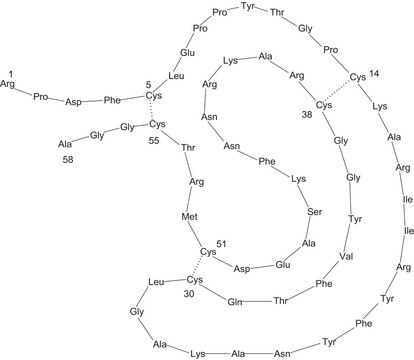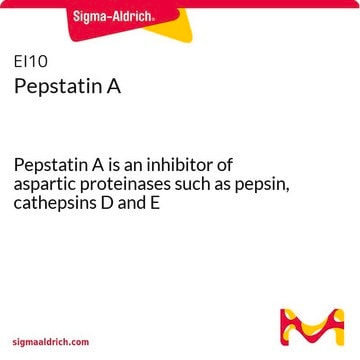P4265
Pepstatin A
powder, ≥75% (HPLC)
Synonym(s):
Pepsin inhibitor
About This Item
Recommended Products
product name
Pepstatin A, microbial, ≥75% (HPLC)
biological source
microbial
Quality Level
Assay
≥75% (HPLC)
form
powder
mp
233 °C (dec.) (lit.)
solubility
ethanol: acetic acid (9:1): 1 mg/mL, clear to hazy, colorless
storage temp.
2-8°C
SMILES string
CC(C)C[C@H](NC(=O)[C@H](C)NC(=O)C[C@H](O)[C@H](CC(C)C)NC(=O)[C@@H](NC(=O)[C@@H](NC(=O)CC(C)C)C(C)C)C(C)C)[C@@H](O)CC(O)=O
InChI
1S/C34H63N5O9/c1-17(2)12-23(37-33(47)31(21(9)10)39-34(48)30(20(7)8)38-27(42)14-19(5)6)25(40)15-28(43)35-22(11)32(46)36-24(13-18(3)4)26(41)16-29(44)45/h17-26,30-31,40-41H,12-16H2,1-11H3,(H,35,43)(H,36,46)(H,37,47)(H,38,42)(H,39,48)(H,44,45)/t22-,23-,24-,25-,26-,30-,31-/m0/s1
InChI key
FAXGPCHRFPCXOO-LXTPJMTPSA-N
Looking for similar products? Visit Product Comparison Guide
Application
- as a component of synaptoneurosome buffer to homogenize the C57BL/6 striata
- as a component of cyclin-dependent kinase 5 (Cdk5) lysis buffer
- as an inhibitor to determine the chymotrypsin activity of California spiny lobster
Biochem/physiol Actions
Preparation Note
Stock solutions at 1 mg/ml are stable at least a week at 4 °C. A 1 mM solution in methanol or DMSO is stable for months at -20 °C. If solutions become darker yellow, the reagent is hydrolyzing.
A working concentration of 1 μM is stable for at least one day at room temperature.
Storage Class Code
11 - Combustible Solids
WGK
WGK 2
Flash Point(F)
Not applicable
Flash Point(C)
Not applicable
Personal Protective Equipment
Certificates of Analysis (COA)
Search for Certificates of Analysis (COA) by entering the products Lot/Batch Number. Lot and Batch Numbers can be found on a product’s label following the words ‘Lot’ or ‘Batch’.
Already Own This Product?
Find documentation for the products that you have recently purchased in the Document Library.
Customers Also Viewed
Our team of scientists has experience in all areas of research including Life Science, Material Science, Chemical Synthesis, Chromatography, Analytical and many others.
Contact Technical Service










